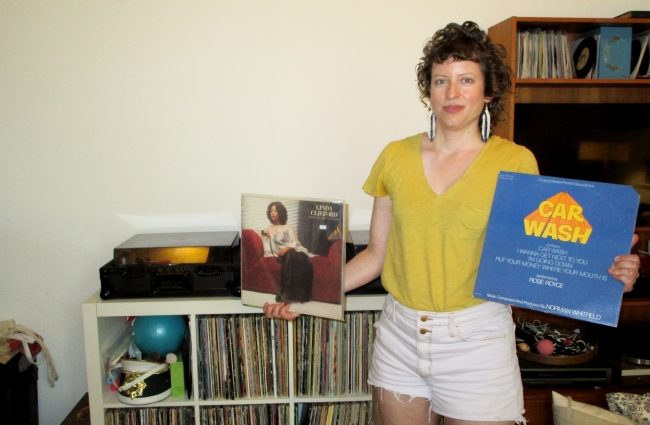I first met Cassie Watters when I was Local President of United Campus Workers (UCW). In 2011 I hired her to be one of our union Organizers (a decision I count among the best during my terms as president). Since then, I have had the privilege to call her a good friend. In the late 2010s she started DJing events under the nom de guerre DJ Cassanova. She has a great passion for music that is much deeper than I knew. I wanted to know more about her love of music. I recently had an opportunity to sit down with Cassie and interview her about her path to becoming DJ Cassanova.
Tom: So just give me a little background on Cassie Watters, AKA DJ Cassanova.
DJC: Yeah, I come from Oklahoma City, born and raised, and come from a family of musicians. And I decided to do something different – to go to college for marine biology all the way on Long Island, New York. But that’s where my dad had finished his master’s, so my parents had lived there, and my brother as well, before he [dad] eventually got a job in the symphony in Oklahoma.
And I lived for twelve years in the Northeast, did not pursue a science degree, and, instead, got involved with the labor movement through, in part, um, outsourcing our custodians on our campus and a coalition that formed to try to bring them back as college employees – which we did. Um, got involved with Jobs With Justice. I worked on a couple different campuses as a staff person as well, and was a member of the Harvard Union of Clerical and Technical Workers up there, which, um, pretty sweet contract, uh, got to take night school classes for forty bucks and finish my two classes that I was short for my bachelor’s degree . . . because of the union.
Tom: Awesome.
DJC: Uhm, and yeah, moved to the Southeast in 2007, first to Asheville . . . but got a job with a community organization here [Tennessee] in 2008 and been living in Knoxville ever since.
Tom: Right.
DJC: But have had a desire to be a DJ for a pretty long time.
Tom: Okay, so, the two are not related, the Labor work and DJing . . .
[both laugh]
DJC: I’m sure they are, you know, at, at some level.
Tom: Um, well . . . so that was, that was one of my other questions, um, how did you get into DJing? I know you come from a musical family . . .
DJC: It’s not really considered a “musical path,” [Tom laughs] I would say, if I had to guess, if my parents would say one way or the other, but I might be being too strict on them. But you know my brother [Sam Watters] was in the pop music industry, and R&B, and so got exposed to a lot of music through him. And, you know, they were in this 90s group called Color Me Badd. But [they] were, before they ever made it, were always practicing and listening to music, and going to shows, and trying to, you know, get in front of people who could help them make it.
Tom: Right.
DJC: And uh, so somehow, they did. And, through a lot of pesky perseverance, they sang for whoever would come into concerts. And they would wait however long it took afterwards, or wherever they were going, the movie theater. So eventually it was Kool and the Gang’s managers who decided they had something that was worth checking out.
Tom: Oh wow.
DJC: And they said if you come to New York we’ll try to get you a record deal. So, they did. So, I mean, just getting exposed to a group like Kool and the Gang, even through their managers, is like, quite a diaspora of R&B music, and you know, that side of the industry. My brother was starting to listen to a lotta more of that kind of stuff. Sly and the Family Stone. And I didn’t know any of that before then, and, yeah, it just became an interest, like, um, to delve into over the years.
And I don’t know when I got interested in vinyl, but it was probably my friend and her dad, who is a real music nut, and one of his best friends in San Diego, was, like, a vinyl filer, or whatever . . . But just, she had records and we would talk about ‘em, and like, and I think that’s when I first got into it. And the idea that you could go into a store and just dig around and find random old stuff, whether you know what it was or not, and follow the trails through the liner notes, or the, you know . . . yeah, just figuring that out was fun.
Tom: So, getting into vinyl kind of came first. At what point did it shift from ‘I like listening to vinyl music’ to ‘I wanna DJ.’”
DJC: I think probably DJing was maybe before that. Just the idea of it and sort of the . . . I just did this class, you know, with Pellissippi, this sound production class. Our final project was a YouTube video, like a five-minute, four-minute. And so, I did it on “Why I Wanted and Still Want to be a DJ” and then the subtitle was “The Love of a Vibrant Dance Floor.” So, I think dancing had a lot to do with it, too, and the ability of, like, the person who’s playing the music to create something that’s really fun and vibrant and the crowd catches onto and it ebbs and flows based on what the DJ’s doing and . . .
Tom: Performance.
DJC: Yeah.
Tom: Now you’ve been DJing for a while.
DJC: Yeah, I sorta – I just kinda ripped the Band-Aid off when I had some partners to kind of lean on and not have, I mean the equipment itself is expensive and the, um, learning curve of how to do it all yourself is daunting.
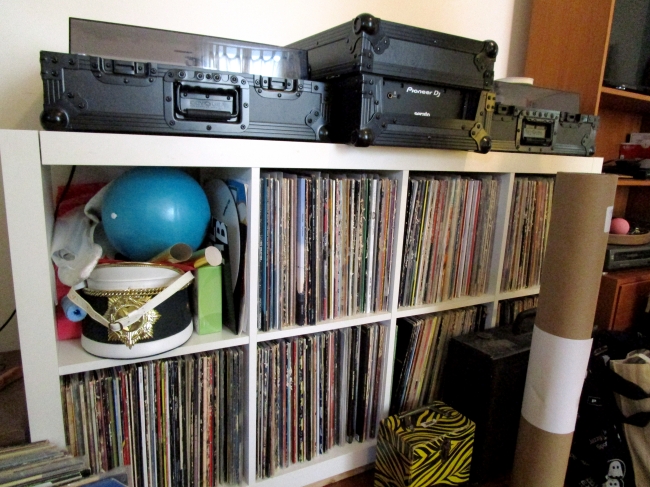
Tom: Like, setting up the equipment?
DJC: Yeah. And make it function. Well, getting the equipment. It’s expensive, but I was able to use one of my stimulus checks to get that set. But, you know, for instance I don’t have speakers that I can use that would be functional for like a large room. Um, but when this fundraiser came around for . . . I think we first did it for City Council Movement, the three of us, um, there was a few different times where I had just, you know, used someone else’s gear, but brought my vinyl and then – and then, as Captain Ed started getting more serious and getting his gear all together, and then it was like, “Okay, well I have a chance to kinda practice.”
Tom: Right. So, your two compadres that was–
DJC: . . . to kind of finally get out there, yeah. Good God Claude and Captain Ed, yeah. And Claude had been DJing before Ed and I ever did. He’s been into vinyl for a long time, too. And they didn’t know each other. And then one day I saw Claude at Pellissippi and, talking about whatever, and he mentioned he had just DJ’d a party or an event at the school, or both, and I said, “What?” and, so, just thought we would try it out together and it was a blast . . .
I spend a lot of time collecting 70s and 80s disco and R&B, because that’s the era I became the most interested in, um, of like, kind of the evolution of Hip-hop in a way, but, when disco started to change into R&B, and then R&B itself was changing into something else, too, as the 80s went on, but the overlap, and then influence of funk music in both of those. So that’s what I’ve been in a rabbit hole about now for many years. Not that I have a lot of money to do anything about it, but, you know, when you’re out there, you’re like: Yes! I finally found this album, you know, or that twelve-inch of this song that I think is awesome.
Tom: So, are you a music collector of all kinds, or do you stick with vinyl, or . . .
DJC: Yeah, I went into the music blog Rabbit Hole when I had a desk job, especially–
Tom: Oh, “Rabbit Hole” is a music blog where you can look up stuff, or what is–
DJC: No, just like figuratively. So, when I worked at Harvard and I had a desk job and I was bored a lot of the time, um, and didn’t feel bad about surfing the internet – there are, there were a lot of – this was in the 2000s – a lot of music blogs before it became as illegal to download tracks. I had a coworker who would give me some that he liked, and so, went down those rabbit holes on those individual music blogs. Like, this person has a lot of, kind of, club music with a lot of different remixes. This person, this blog, Setting the Woods on Fire, was a lot of Alt-Country, and Country that I didn’t know about, and that I really like. And I was always interested in what, how they were writing about each track. Mix Tape Riot was the, kind of more club music with remixes. Um, and it was just kind of a moment on the internet with people putting content out, but, also, there was one I downloaded just a crap ton over the years called Art Decade, which is, and it was like the long decade of the 70s, but just all music influenced by the 70s. But it would have, like, you know, an image or something, or writing, or a link to something else, and not just a song, so it was just like really interesting.
Tom: So, did you – is that what you kind of listened to growing up? Or, or what did you, what are your earlier . . .
DJC: No, not necessarily. I mean I think the, specifically the 70s. My brother was never into disco, ever that I know of. And I think the way I understood disco from a young age was as a joke, you know, and, or the butt of a joke, and–
Tom: [Chuckles] I made a lot of those jokes.
DJC: [laughs] Yep, and, uh, I think, you know . . . I think I knew a little bit about house music, but I didn’t know about, you know, clubs. Uh, and so like the famous clubs, not just Studio 54, but like Paradise Garage, like I’ll show you this photo that I ordered a print of and we’re gonna get framed that captures to me why I’m fascinated with that era, ‘cause it’s just like . . . It’s very sexy. People are, you know, variously clad and, it’s – obviously they’re sweating [chuckles] but it looks like such a good time.
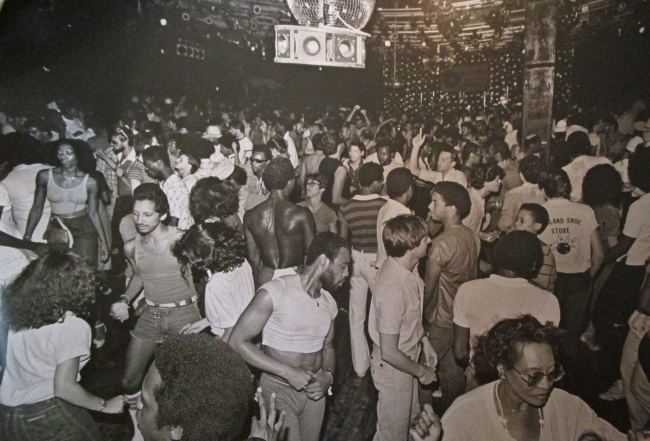
Tom: Right.
DJC: Um, that is pretty captivating to me, like, to be able to contribute to something like that, create that.
Tom: The dance party . . .
DJC: Mmm. Hmm.
Tom: So, have you always been into dancing?
DJC: Yeah, in high school, I was on a dance team. My public high school had a varsity dance team, which is not a typical thing for a public school.
Um, the teacher there had been there for a long time, and developed it, and it was really fun. We had an annual spring dance show, and, you know, we all got to be – we all got to help choreograph the dances for that. Everything else our teacher choreographed, but we could choose the music and choreograph the dances in the spring dance show, which was just a real creative outlet. So, I would – I would make mixes, actually, for the dances, you know, with cassettes [chuckles] and CDs. And so, you know, that was popular then. Like there would be all manner of like street, funk, hip-hop, whatever, jazz dancing that we were doing, and so, you know, mixing the different songs was always fun.
Tom: Right. So, are there any like memorable moments – things that you can now look back on and see where that kind of . . . in addition to, you talked about your brother and that experience. So, whether there were specific experiences then, or other things that happened . . . that kind of turned on a light that you can think of?
DJC: I think like, you know, the advent of break dancing and the tentacles reaching as far as Oklahoma City. You know the movie Breakin’ came out, but I was younger than my brother. He’s, you know, the same age as you, and, um, but the way that seemed to just captivate everyone’s attention all of a sudden. And there was like, you know, cardboard in the yard and they had a group – a break dancing group, and, you know, my friends and I, we would sort of try. We didn’t feel like we knew what we were doing. And it wasn’t that friendly to girls, to be honest–
Tom: Right, yeah.
DJC: The idea of that scene was like fun. And there was a competition in the parking lot of the Sound Warehouse [giggles] which was not, you know, it doesn’t exist anymore. It was a music store called, um, like an appliance store and music store, I think. You know, break dance groups were competing. And my brother and his friends, including one of the guys that ended up being in Color Me Badd, they – their outfits included parts of the band uniforms from my mom’s middle school band that she was director of, [both laugh] you know. Anyways, just being able to watch that was really thrilling. And I think it was just, yeah, like, the music was creating this scene, um, but it was also the dancing, too.
Tom: Um, so how do you pick a show? I mean do you just grab what you feel like playing that night or . . .
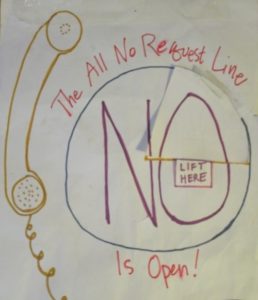
DJC: Yeah. Some of it I’d like to . . . I think I started out thinking that I wanted to just play whatever I felt like, and the crowd be damned, even knowing that that’s not actually what makes for a good DJ [chuckles]. Just being a little stubborn about it. I have made this sign that I can show you that you might’ve seen before, which I just . . . With my friend Maya, we got the chance to DJ another fundraiser, um, at Church of the Savior, which is funny, one time. But it was all electronic, digital, and I don’t think I was ready at that point to DJ a crowd where people would make requests, but I went in anticipating they would, and so I made this sign that says “The All No Request Line is Open.” [giggles] Just to amuse myself, because, like, as if you would continue to call and request, but it would always be “No.” I brought that sign every time, but, then again, when Captain Ed and Claude and I first DJ’d, I had since come to realize, like, you really can change, you know, an atmosphere, if you have some jams people really like to dance to, and–
Tom: Stuff you know that crowds like.
DJC: Yeah. And, um, be able to, you know, get the atmosphere kicked up. Yeah, sometimes I really like listening, and thinking of a, like, what other song a track reminds me of, and then feeling, ‘Oh, yeah, that would be good in a set together.’
Tom: So, you don’t start out with ‘I’m gonna start out with X, Y, and Z.’
DJC: Well, I do sometimes. So, that’s what I’ll do is kind of just listen to different songs and then think ‘That would sound good with this Prince song.’ And then I’ll – I make a list, like a handwritten list, and then sometimes I’ll, you know, reshuffle it, um, and sometimes I’ll, I’ll bring it in that order. Other times I’ve just showed up and then been like ‘What do I feel like playing?’ and ‘What would sound good after what Ed played?’ We kind of try to look at the vibe of the event, you know, is it a dance party or is it an open air market, is it a, you know, Friday night Happy Hour, which is what we’ve been doing a lot of; Ed and I got the chance to play something titled a disco, which we weren’t sure what it was gonna be like during Pride in South Knox, at Honeybee Coffee. And, uh, they turned it into a legitimate disco. They had a disco ball and decorated it, and this extremely young crowd started streaming in and we were kind of freaked out, like . . .
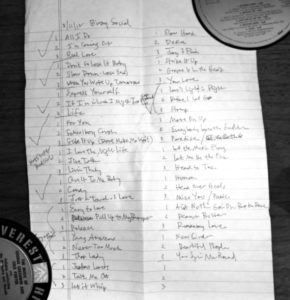
Tom: Oh, wow.
DJC: ‘Are they actually gonna like actual disco music?’ And they loved every single thing we played. I mean, it was a little bit of variety. It wasn’t just straight disco, but people came ready to party and it blew our minds. We were like, ‘This is the crowd we’ve dreamed of.’
Tom: Wow . . . So, were there any people that like inspired you or motivated you in any way?
DJC: Yeah. Like about DJing?
Tom: In general – in DJing, and music, or performing.
DJC: Yeah, definitely. Well, this guy J Dilla, whenever he passed was during the time when I was looking at those music blogs, and I had never heard of him before he passed, and so had not a lot of people ‘cause he was just kind of in – behind the scenes in the producing world. But –
Tom: J Dilla?
DJC: J Dilla, yep. Um, and he made music by messing around with pieces of older music and either slowing it down a little or speeding it up a little or repeating it. It was pretty creative and I hadn’t ever heard anything like that. And it really got like a, you know, like an ear worm like in my brain. Like, I felt like it was affecting my brain when I was listening to it in a way that other music hadn’t, um, because it was so different and because the way he was playing around with the tempo. This book, [reaches for book] actually, I thought was accurate. I’ve only just barely started it, just didn’t come out too long ago. He invented something, um, like a new, um, a new tempo, a new time. It’s like [reading from book] “Before J Dilla, our popular music essentially had two common time fields: straight time and swing time. Meaning that musicians felt and expressed time as either even or uneven pulses. What Dilla created was a third path of rhythm juxtaposing those two time fields, even and uneven simultaneously, creating a new pleasurable, disorienting rhythmic friction in a new time fill.” He [the author] calls it Dilla Time. Like J Dilla’s music was just kind of like wow. What else – could I ever do that? I mean . . . I haven’t done that. I haven’t tried to, necessarily. It seems a little like a fantasy, like when am I ever just not gonna need to like work?
[Both laughing]
Tom: Right, right.
DJC: But, um, J Dilla is definitely one. And Questlove, I think, is another big one. For his, you know kind of – his own voracious appetite for different things. And the way he talks about J Dilla is really interesting, too, and reverent. Um, I’m trying to think about specifically with Questlove . . . He put out some collections of music that he had just chosen. This is before all of the stuff he’s done in recent years, ‘cause now, you know, he’s writing books and helped make a documentary and all that. Um, it just seemed like I was intrigued with his interest in music and willingness to like do deep dives. And he made this collection of 70s kind of slow jam music, some of which was a little obscure, that I was like ‘Oh that’s cool.’ I bought that on vinyl. Like maybe I first bought it on a CD or something. Um, and there’s definitely like other hip-hop DJs I would say were influential. Um, and then recently there’s a woman named DJ Soul Sister out of New Orleans who seems to have gone down a certain similar path, a rabbit hole of 70s disco, R&B, funk – and, a lot of it coming from there. She’s from there and she’s like a music archivist, I think, even. That’s her day job. But there’s not that many female DJs and that’s a big hurdle to feel like you can learn the technology to feel confident, and so–
Tom: Not having those sort of role models, so to speak–
DJC: Mmm hmm.
Tom: –or, or people you’ve seen that have done it.
DJC: Yeah, yeah. I took a class during the pandemic that was offered by a woman out of D.C. It was just over Zoom. And it was really helpful. And she’s a DJ. She does more like digital DJing. But just to have a reason to think about what my style might be, or who my influences are, and, and then how to start thinking about equipment and how to start thinking about going out and doing it. I have CDs. I have cassettes. I wanna have a double cassette player and just go ahead and have all the ability to listen to the radio or make a mixtape from the radio or from tapes or from CDs or from vinyl. Someday, I’ll have a mega – I want the old school, you know, hi-fi home audio setup, someone to come in here and set it all up.
Tom: Right. Yeah. So where, where does this go from here? Do you have any plans for . . .
DJC: Um, I don’t know. I feel like it’ll just be a lifetime of farting around, honestly. And then maybe someday I’ll do this more, or be able to. Like I – maybe I’ll pay off my debts some day and do this full time. It doesn’t provide insurance, so maybe not. Who knows? I don’t know. I think I’m gonna go play after a performance of my best friend’s husband’s band in Pittsburgh. You know, they’re not an R&B band. They’re sort of like a weird rock band. But, like, he and I talk music a lot whenever I’m up there and um, I’m looking forward to a collaboration like that – It’ll be totally different, and I don’t know, you know, like I’m not just playing for Happy Hour. It’ll be after a performance and, um, there’s a group called LCD Sound System and they just had a series of performances in New York where they had a DJ open up for four nights in a row as the warm-up set. But I’ve listened to those a bunch, ‘cause I – it’s, I like that idea. Someday, that would be cool to do more of if I’m ever in the position to. And that feels like a little more of, that’s not like opening for LCD Sound System, but for Chad’s band, Animal Scream in October in Pittsburgh after they perform. That’ll be neat.
Tom: Yeah.
DJC: Stuff like that, you know. I would like to get to a place where I feel comfortable and I have the gear and I feel confident about just going out and doing a one-off thing like that, not like I’m gonna try to make a living at this, necessarily. But that’s what I’d like to be able to do.
**Featured image of Cassie Watters, AKA DJ Cassanova and all photographs here were taken by Tom Anderson
